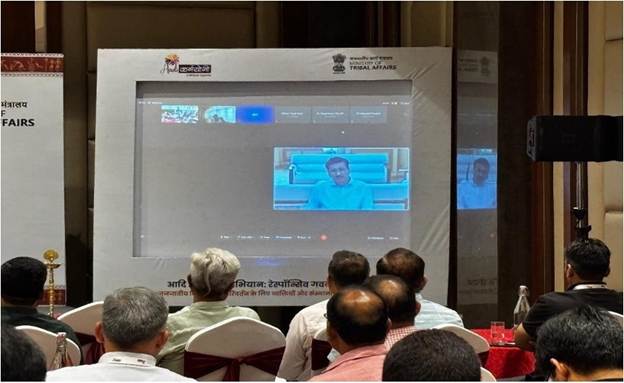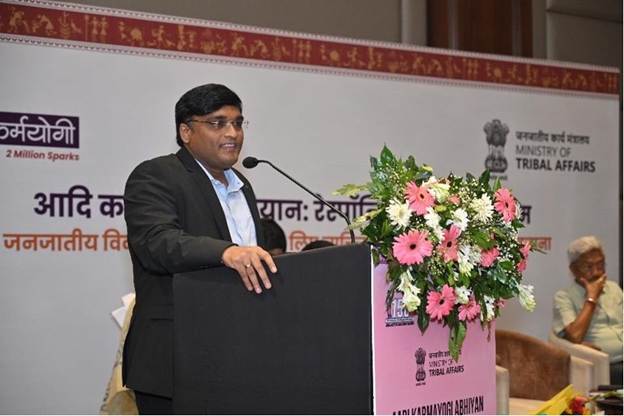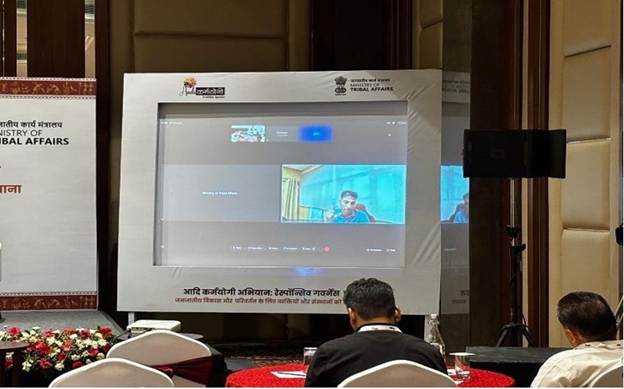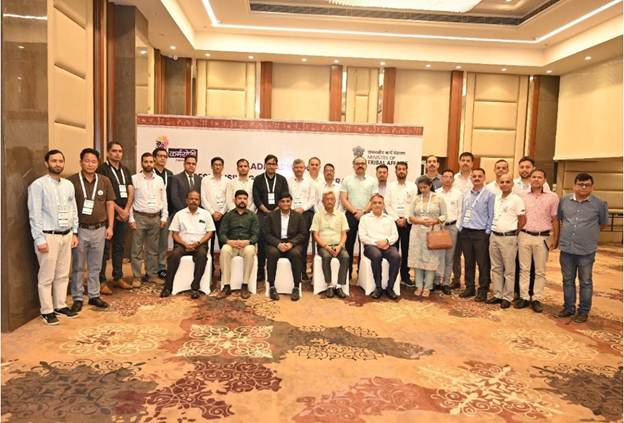Ministry of Tribal Affairs
Empowering Tribal India: 3rd Regional Process Lab Launched under Adi Karmayogi Abhiyan in Dehradun
Posted On:
01 AUG 2025 8:12PM by PIB Delhi
In a landmark step toward Viksit Bharat by 2047, the Ministry of Tribal Affairs, under the visionary leadership of Hon’ble Prime Minister Shri Narendra Modi, launched the 3rd Regional Process Lab (RPL) of the Adi Karmayogi Abhiyan in Dehradun, Uttarakhand. This pioneering initiative aims to build a cadre of 20 lakh tribal grassroots functionaries and village-level change leaders, who will drive inclusive development and strengthen last-mile service delivery in tribal regions.
Hosted at Regenta Hotel, the RPL Dehradun marks the operational kickoff of this national mission. It will serve as a capacity-building hub for State Master Trainers (SMTs) from Uttarakhand, Himachal Pradesh, Jammu & Kashmir, and Uttar Pradesh.
Reimagining Governance at the Grassroots
Adi Karmayogi Abhiyan is more than a programme, it's a national mission to reimagine governance from the grassroots, rooted in India’s tribal ethos and led by local champions. Aligned with transformative initiatives like PM-JANMAN and DAJGUA, the mission stands on the three pillars of convergence, community, and capability.
It embodies governance with both soul and structure, where aspirations of tribal youth are met with responsive institutions, and policies are delivered with dignity, timeliness, and purpose.
Shri Vibhu Nayar, Secretary, Ministry of Tribal Affairs, addressed the SMTs virtually and described the Adi Karmayogi Abhiyan as a “historic opportunity” to redefine the landscape of tribal governance in India.
“This initiative marks a significant shift toward a more responsive, inclusive, and grassroots-driven governance model. The aim is to develop localized and context-specific solutions that emerge from the lived realities of tribal communities,” he stated.
He emphasized the need for inter-departmental convergence, ensuring collaboration across various government departments to address the multifaceted challenges tribal communities face. Calling upon the SMTs to become "pioneers of change," he envisioned them as key agents in bridging the last-mile governance gap, “Take ownership of the mission, act as catalysts for transformation, and empower tribal communities through active engagement and leadership.”
He further asserted that effective policymaking must be informed by the voices and experiences of those it seeks to serve, ensuring governance evolves from the bottom up and results in deeply impactful and well-informed policies.

Dr. Sridhar Babu Addanki, Secretary, Social Welfare Department, Government of Uttarakhand, warmly welcomed participants to the Abhiyan and described it as a timely and transformative initiative with the potential to reshape tribal development in the state.
He stressed the importance of designing programmes that are culturally rooted and locally relevant, saying, “Such an approach ensures that interventions reflect the unique identities and needs of tribal communities and fosters meaningful and respectful engagement.”
Reaffirming Uttarakhand’s full support, Dr. Addanki announced, “The state will provide institutional backing through comprehensive training for both State and District Master Trainers (SMTs and DMTs). We will engage Population Services International (PSI) as the lead Civil Society Organization (CSO) to support this effort.”
He concluded with a message of confidence, “I am sure the trainers gathered here today will become true changemakers, and we reiterate our commitment to inclusive and sustainable tribal development.”

Shri Prasanna Ramaswamy G., Secretary, Tribal Welfare Department, Jammu & Kashmir, highlighted the importance of intent, dedication, and belief in transforming public service. While acknowledging the significant progress made in tribal development, he emphasized that the Adi Karmayogi Abhiyan would help, “Close the critical last-mile delivery gap through a robust, cadre-based capacity-building model.”
He spoke with enthusiasm about the learning opportunity, “The 7-day residential workshop is a lifetime opportunity, not just to learn the content but to change the way we approach our work. This is the beginning of a new culture of committed community-based governance.”
The launch was attended by officials of the Ministry of Tribal Affairs, including Smt. Anshu Singh, Deputy Director General (DDG) and Shri Ganesh Nagarajan, Deputy Secretary (DS), signifying the Ministry's deep institutional commitment to strengthening governance in tribal areas.

Adi Karmayogi Abhiyan: A Mission for Every Stakeholder
The Adi Karmayogi Abhiyan promotes responsive governance through:
- Bottom-up visioning
- Real-time grievance redressal
- Collaborative implementation
It is built on convergence across key ministries and departments, including:
- Tribal Affairs
- Rural Development
- Women & Child Development
- Jal Shakti
- School Education
- Environment and Forests
The RPL in Dehradun is the third in a series of cascading capacity-building hubs. SMTs trained here will establish State Process Labs (SPLs) in their respective states, which will go on to train District Master Trainers (DMTs). The programme also integrates Civil Society Organizations (CSOs) to facilitate participatory learning and ensure local contextualization of content.

RN/
(Release ID: 2151549)
Read this release in:
Hindi